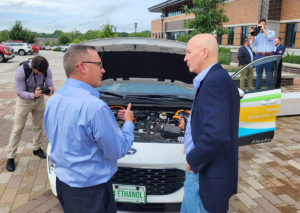 A bill just introduced in the Senate would level the playing field for vehicles running on low-carbon liquid fuels like ethanol by properly recognizing the emissions benefits associated with using E85 flex fuels (which contain 51-83 percent ethanol).
A bill just introduced in the Senate would level the playing field for vehicles running on low-carbon liquid fuels like ethanol by properly recognizing the emissions benefits associated with using E85 flex fuels (which contain 51-83 percent ethanol).
U.S. Senator Pete Ricketts (R-NE) introduced the bipartisan Flex Fuel Fairness Act last week along with Senator Amy Klobuchar (D-MN). Ricketts participated in a roundtable Monday in Lincoln with members of the Nebraska Ethanol Board and other biofuels stakeholders, including the Renewable Fuels Association, which had its Flex Fuel PHEV project car on display.
 “This legislation helps unlock the potential of renewable fuels and puts more tools in the toolbox for automakers who must comply with increasingly stringent vehicle emissions standards. By leveling the playing field for the production of all clean vehicle technologies, this bill allows low-carbon liquid fuels like ethanol to work alongside clean electricity, electric vehicles, and other technologies to reduce emissions from transportation,” said RFA President and CEO Geoff Cooper.
“This legislation helps unlock the potential of renewable fuels and puts more tools in the toolbox for automakers who must comply with increasingly stringent vehicle emissions standards. By leveling the playing field for the production of all clean vehicle technologies, this bill allows low-carbon liquid fuels like ethanol to work alongside clean electricity, electric vehicles, and other technologies to reduce emissions from transportation,” said RFA President and CEO Geoff Cooper.
The legislation is designed to create more equitable incentives and market signals for the production of a broader portfolio of clean vehicle technologies. Under current EPA emissions regulations, battery electric vehicles (EVs) benefit from an assumption that there are zero carbon emissions associated with operating the vehicle. EPA announced plans to make the “zero emissions” assumption permanent for EVs in its recent proposed rule for 2027-2032 emissions standards. In essence, EPA’s regulations assume a battery EV will always operate on zero-carbon electricity over its entire lifetime.
To create an equitable incentive for the continued production of FFVs, today’s legislation creates a similar assumption that FFVs always operate on E85—a fuel that reduces lifecycle GHG emissions by 31 percent compared to gasoline. Thus, for the purposes of demonstrating compliance with vehicle emissions standards, the legislation allows automakers to use an emissions value for an FFV that is 31 percent lower than the emissions value for the corresponding non-FFV model.

